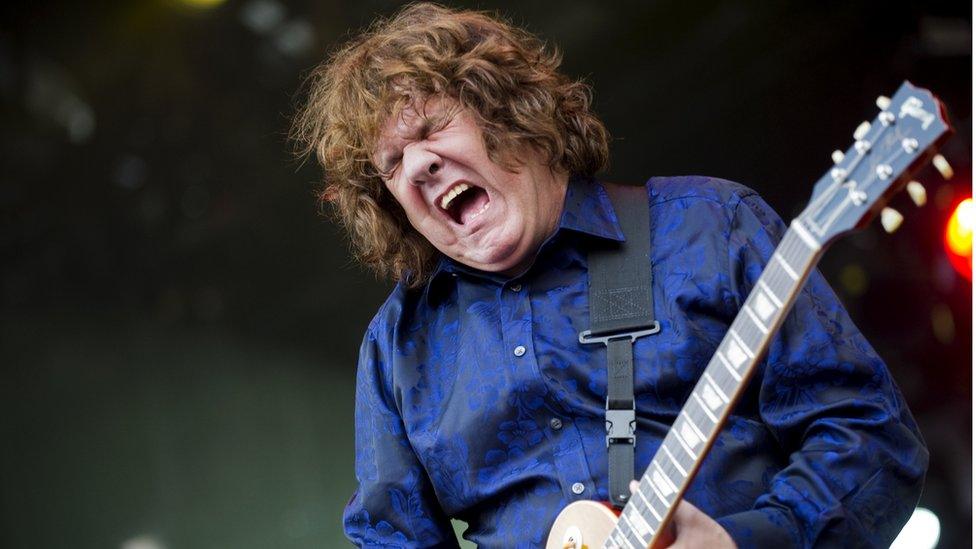'Thin Lizzy star used to stay in my flat'
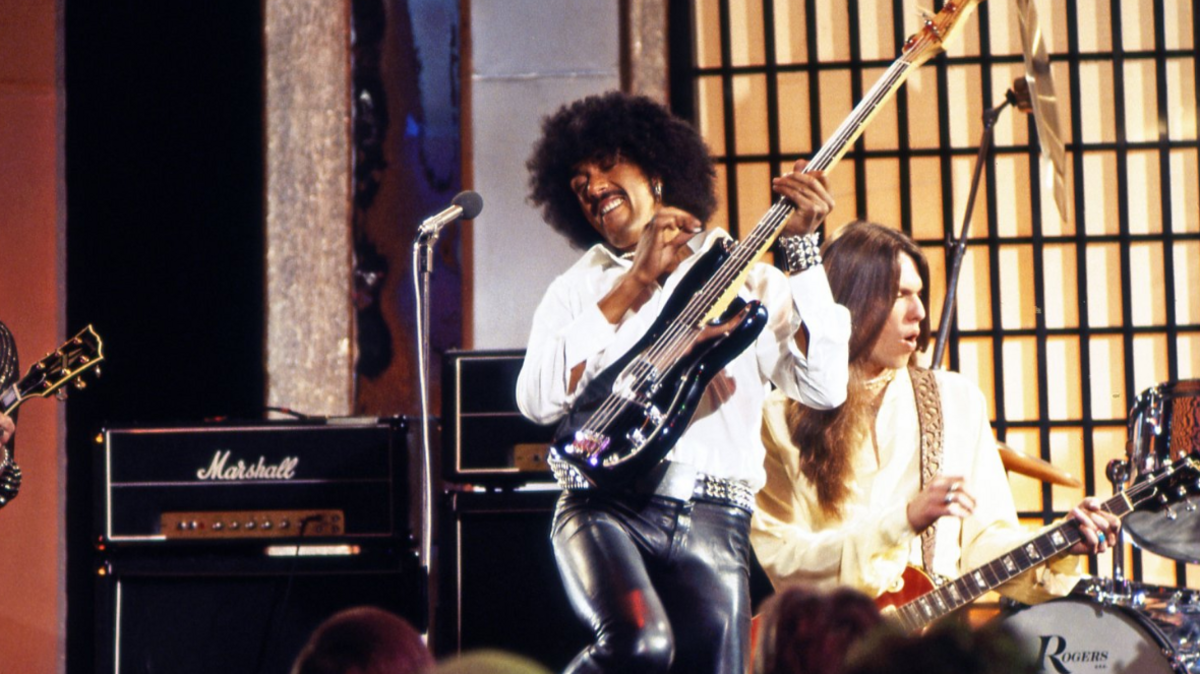
Phil Lynott of Thin Lizzy was one of the artists Roger Armstrong encountered
- Published
Motörhead, The Clash, The Damned, The Jam, Simple Minds.
All iconic bands, and Roger Armstrong had a part to play in the birth of them all.
Armstrong moved to London from Belfast - via Dublin - in the mid-1970s.
But before he left Ireland, Armstrong had already encountered a rock icon while tour-managing Horslips.
That was through his friend Ted Carroll, who managed a promising Irish band called Thin Lizzy.
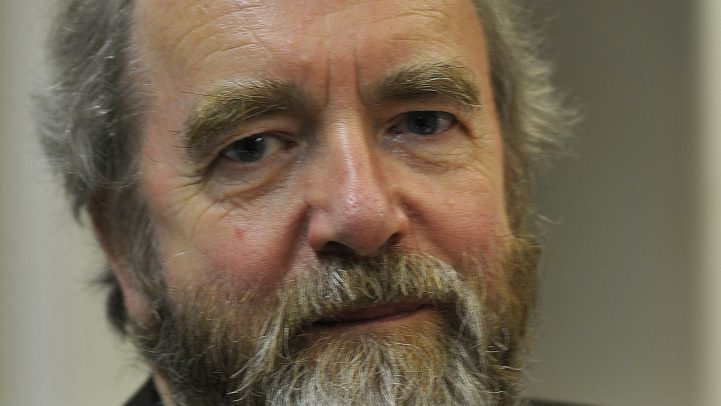
Roger Armstrong moved to London from Belfast, via Dublin, in the 1970s
"Phil Lynott used to stay in my flat," Armstrong told BBC News NI.
"I had a spare room in the flat and he would stay there."
After managing Thin Lizzy, Ted Carroll sold records on a stall called Rock On in Soho in London and later opened the Rock On record shop in Camden.
Roger Armstrong moved to London to join him and Rock On had some notable customers, including the late Shane MacGowan long before he joined The Pogues.
"He would turn up at the stall and buy records and he was very knowledgeable about music, Shane," Armstrong recalls.
MacGowan soon joined his first band - a London punk rock outfit called the Nips.
Others to frequent the stall were members of The Sex Pistols and The Clash.
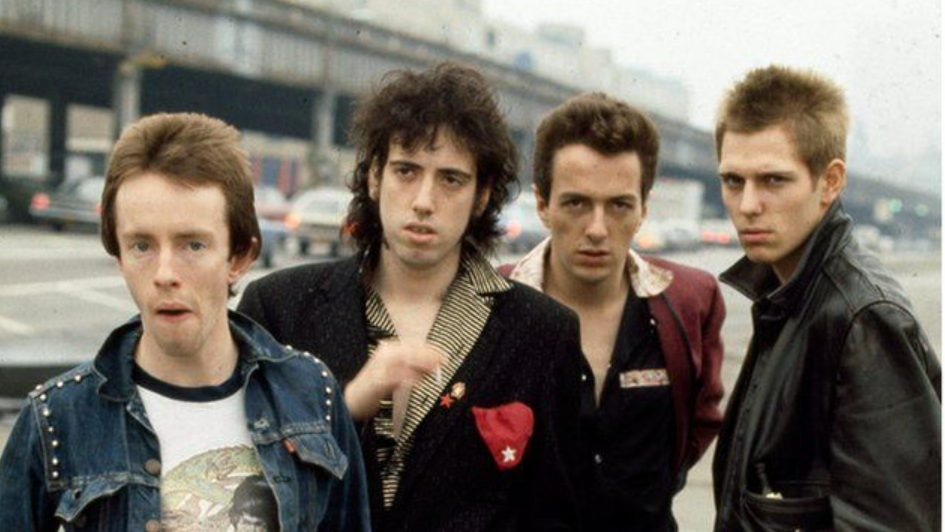
The Clash frequented the Rock On record shop and Armstrong said the talent of Joe Strummer (third from left) was obvious before he joined the band
Armstrong and Carroll soon took their love of music a stage further, setting up their own label called Chiswick Records.
The third record released by Chiswick was by a band called the 101ers, with a front man called Joe Strummer.
Strummer later joined The Clash, who signed to the major CBS record label, but according to Armstrong his talent was obvious from the start.
"Ted came into the stall one day and said, 'You've got to go and see this band, the lead singer's an absolute star,'" Armstrong said.
So the two went to see Strummer and the 101ers in a small student venue.
"Joe was performing like he was playing the Albert Hall or Woodstock, giving it his all," Armstrong remembers.
"The energy levels coming off Joe, he could have powered the venue himself."
Chiswick records also had their eye on other new talent.
"The one we got closest to was The Jam, because Paul [Weller] used to buy his Motown records off me," Armstrong said.
The Rock On stall actually provided the electricity for one of the first ever gigs by The Jam in Soho market.
"They were powered off our lightbulb essentially!" Armstrong laughed.
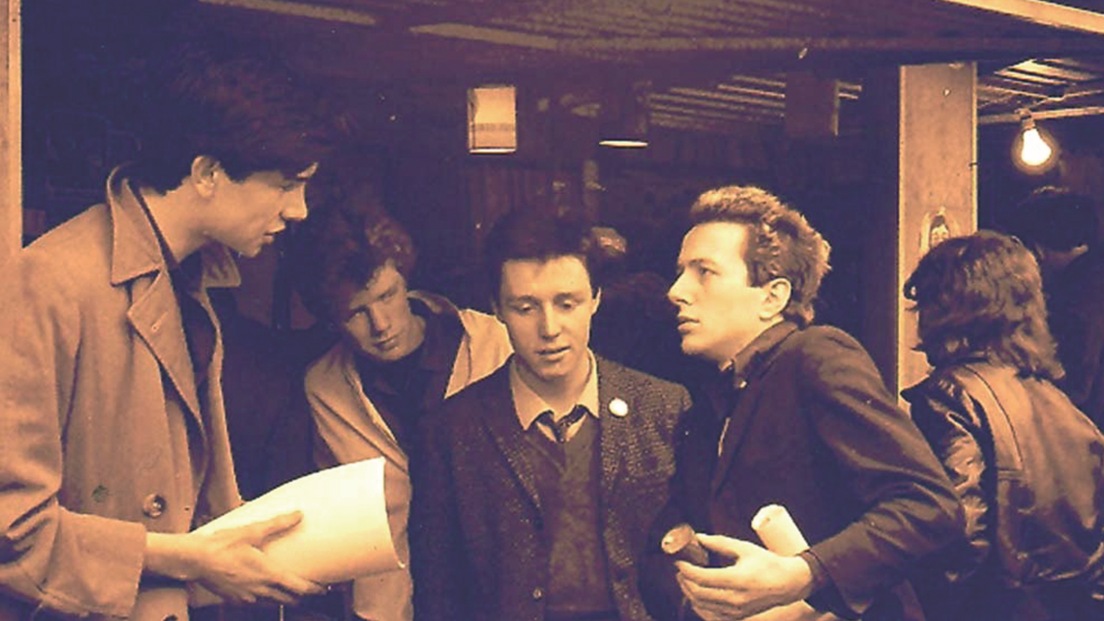
Joe Strummer (fourth from left) outside the Rock On stall
The Sex Pistols changed the look and the sound of music, and rocked society, but Armstrong remembers being at one of their first gigs, which was relatively low-key.
"We kind of enjoyed them for their punkiness and their lack of smoothness," he said.
"John [Lydon, aka Johnny Rotten] had his attitude already baked in.
"At one stage some long-haired student chucked an empty beer can at him and he picked it up and chucked it back, and that was the height of the excitement."
Armstrong remembers the infamous live television interview The Sex Pistols did with Bill Grundy in 1976 - sprinkled with four-letter words - as "what blew it up".
"I knew Paul [Cook], the drummer from the Pistols, he was a nice guy," he said.
"I knew Steve [Jones] a bit, I really knew Glen [Matlock] better than any of them."
But in The Damned, Chiswick soon signed their own iconic punk band.
Armstrong produced their Machine Gun Etiquette album.
"Captain [Sensible] is an astonishing player, he really is an astonishing musician, he's not like a two-chord merchant at all," Armstrong said.
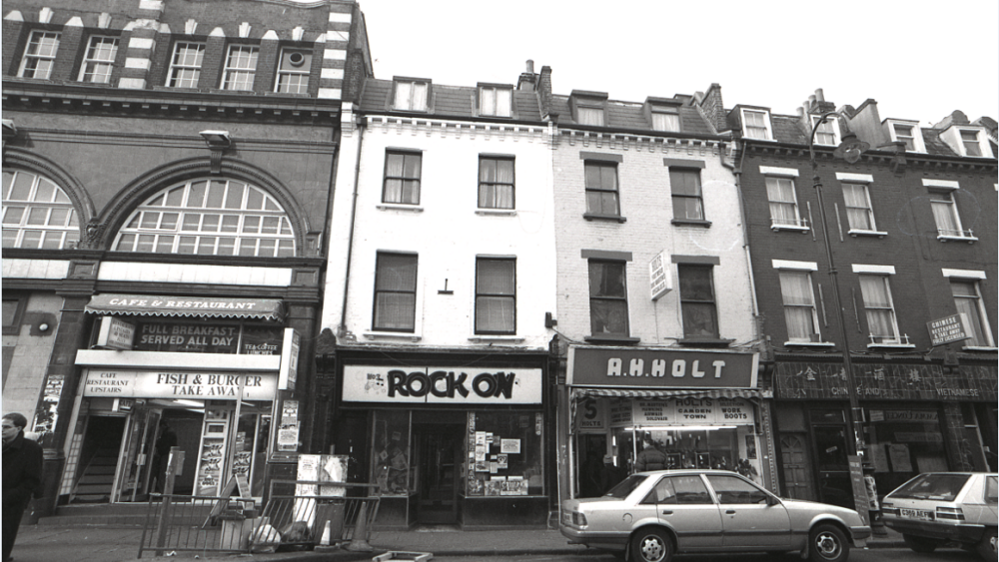
The Rock On record shop in Camden, London
Another rock icon also played with the band a few times.
"The Damned and Motörhead were always very close," he said.
"Lemmy played a couple of gigs with them on bass."
Lemmy Kilmister of Motörhead would also drop by the Rock On stall to play Ted and Roger early recordings by the band.
And that led to Chiswick releasing Motörhead's self-titled debut album.
"What started as a single became an album!" Armstrong said.
"Ted went down there and it was like mayhem, but they had done the album basically.
"We hadn't got the money to do it, but somehow or other we managed to see it through and get the first album completed and get it out.
"Lemmy was the sweetest man you could hope to meet.
"Him and Dave Vanian [of The Damned] had in common that they're both what I'd call gentlemen."
Motörhead later moved on to the bigger Bronze Records as Chiswick were a small label.
But the parting of the ways was friendly.
"We realised we didn't have that kind of money and promotional clout at the time, so we understood," Armstrong said.
"I remember meeting Lemmy just as the deal was going down and he said 'I'm really sorry to be leaving Ted and you'.
"He turned to walk away and then he turned back and looked at me and said 'Anyway, you've got the best album that we'll ever make!'
"To which I'd say 'No we didn't,' but it was very nice of him to say so."
Another band called Johnny and the Self-Abusers were on Chiswick too, though they became famous by a different name.
"We'd cut them as Johnny and the Self-Abusers and then their management rang Ted and said 'Look, they've changed their name. Can we change it on the single?'" Armstrong said.
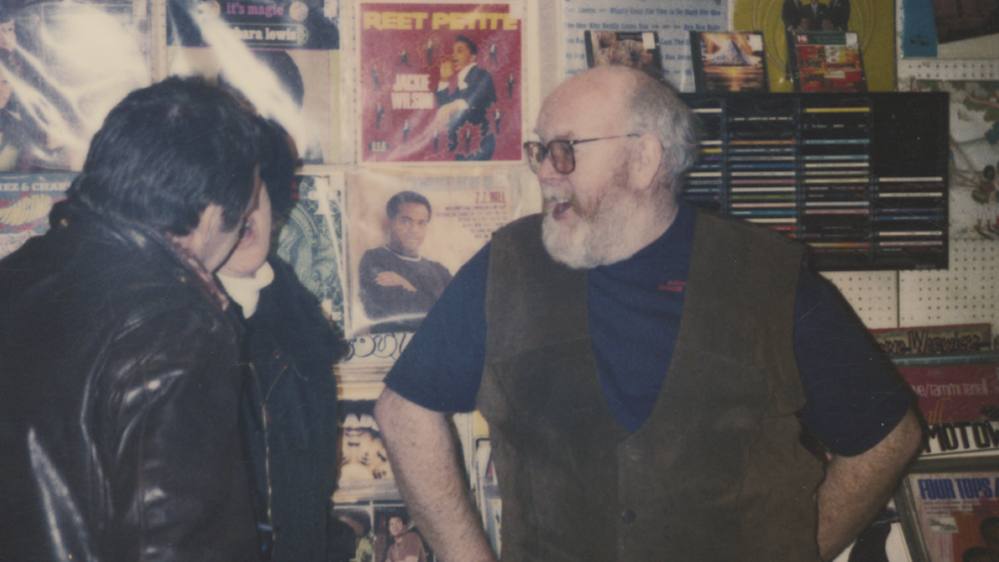
Ted Carroll holding court at Rock On in London
Fans, though, had already put in advance orders in to Chiswick for the Johnny and the Self-Abusers single.
"So we put it out as Johnny and the Self-Abusers," Armstrong said.
But singer Jim Kerr and other members of the band were now Simple Minds.
"They sent us demos on a cassette and in one of the classic comments I said, 'They'll never get anywhere with a stupid name like that!'"
Armstrong said that Chiswick were a small label but were putting out a lot of records, and also re-issues of records by artists from the 1950s and 1960s.
That led to Armstrong, Carroll and Trevor Churchill forming Ace Records to re-issue early records by figures like BB King, Etta James and Howlin' Wolf.
Armstrong no longer works full-time, but still listens to lots of music and compiles albums for Ace as well as helping to run the Armstrong Storytelling Trust in Northern Ireland.
"It keeps me amused, it keeps me out of trouble," he told BBC News NI.
Related topics
- Published23 August 2019
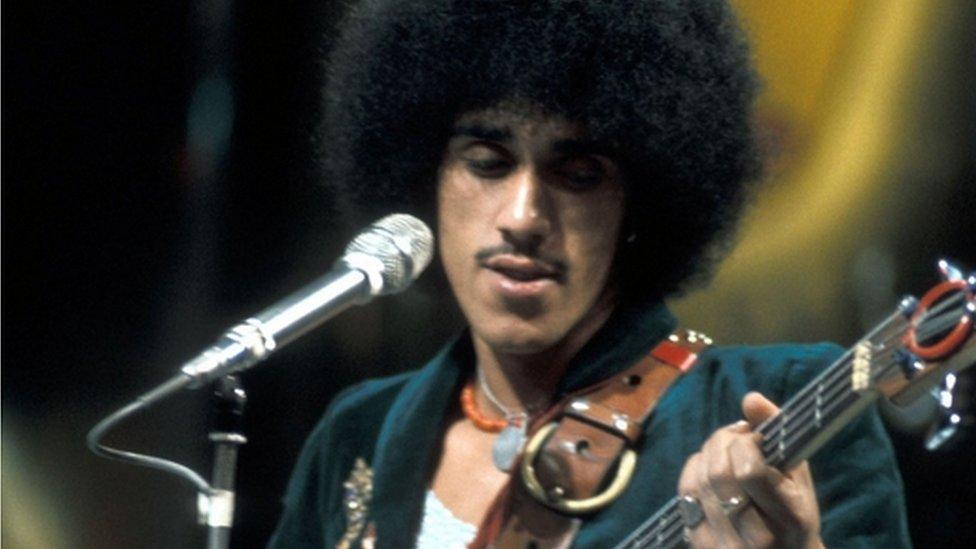
- Published25 January 2019
